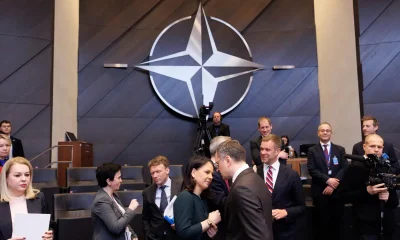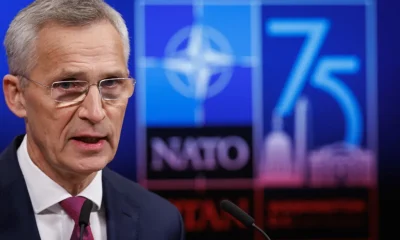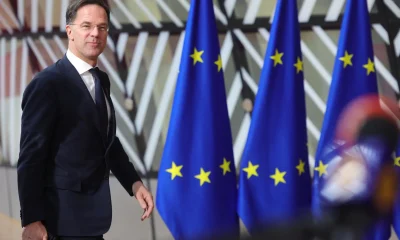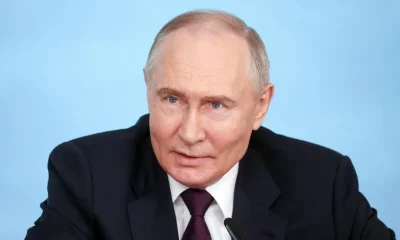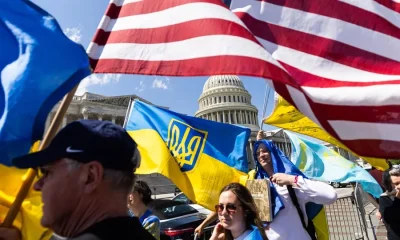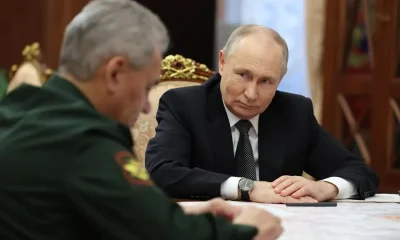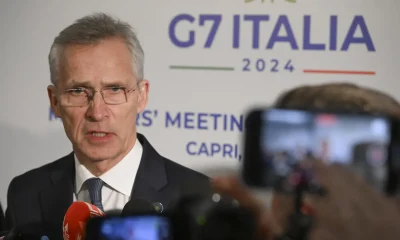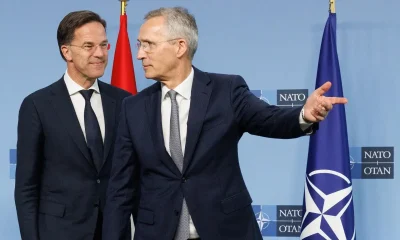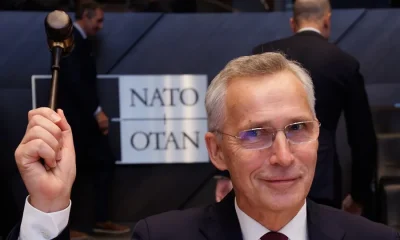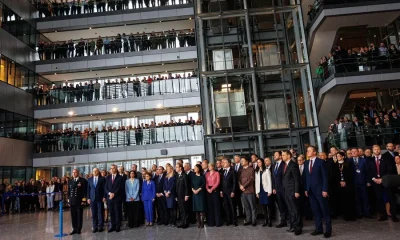International
The EU urges Georgia to withdraw the law on foreign agents that harms its rapprochement with the EU

The High Representative of the European Union for Foreign and Security Affairs, Josep Borrell, with the support of the European Commission, urged Georgia on Wednesday to withdraw its controversial law on foreign agents, considering that it harms its progress towards the EU.
After the approval of this law on Tuesday in the Georgian Parliament, the EU issued a statement by Borrell that could not be on behalf of the Twenty-seven due to the veto of Hungary and Slovakia, European sources told EFE.
Brussels issued a first statement signed by Borrell and the Commissioner for Neighbourhood and Enlargement, the Hungarian Olivér Várhelyi, and later published a second with the only rubric of the head of European diplomacy, supported by the whole of the college of commissioners.
European sources assured that the publication of the first text was due to an error.
“The approval of this law has a negative impact on Georgia’s progress on the EU path. The decision on the way forward is in the hands of Georgia,” the statement emphasized.
In that context, the Georgian authorities were urged “to withdraw the law, maintain their commitment to the EU path and move forward in the necessary detailed reforms.”
The statement also assured that the EU is willing to continue supporting Georgians who work for a European future.
“The EU is on the side of the Georgian people and their election in favor of democracy and the European future of Georgia,” the text stressed.
The statement states that “intimidation, threats and physical aggressions of civil society representatives, political leaders and journalists, as well as their families, are unacceptable” and calls on the Georgian authorities to investigate these “documented acts.”
He recalls that the European Council granted Georgia the status of candidate for accession, understanding that the country would adopt the nine relevant measures that the European Commission established last November.
These steps require that human rights be protected and that civil society and the media can operate freely, they added.
The measures also refer to the need for depolarization and the fight against disinformation.
However, and “despite the great protests and the unequivocal appeals of the international community,” the ruling majority of the Georgian Government has approved the law in Parliament, in third reading, the statement said.
“The EU has clearly and repeatedly declared that the spirit and content of the law do not conform to the fundamental rules and values of the EU.”
In his opinion, that legislation will undermine the work of civil society and the independent media, while freedom of association and freedom of expression are fundamental rights at the core of Georgia’s commitments as part of the association agreement with the EU and any way of joining the community club.
The Georgian Parliament approved the law on foreign agents on Tuesday despite the protests of the opposition and the West, which compare it to the Russian regulations that the Kremlin uses to silence the opposition, in a new twist of tensions in this Caucasian country.
The controversial legislation, promoted by the Georgian Dream government party and whose official name is “On the transparency of foreign influence,” was approved with 84 votes in favor and 30 votes against.
The president of Georgia, Salomé Zurabishvili, announced on Wednesday that she has created and will soon present a “European platform” to prevent the country from returning to the past.
“I have formed a European platform of common solutions that will mobilize Georgia for the parliamentary elections,” the president said at a press conference, alluding to the elections on October 26.
Zurabishvili made this announcement in a joint appearance with the heads of the diplomacies of Iceland, Latvia, Lithuania and Estonia, who arrived in Tbilisi today on a working visit as representatives of the European Union, who harshly criticized the “Russian law” approved the day before by Parliament.
“This platform will allow us to win the elections and finally put Georgia on the path of peace and stability,” said the president, who stressed her initiative to “save the country from returning to the past.”
Zurabishvili stressed that “between 80 and 85 percent of Georgian society supports the European future (of the country), as can be seen in the protests against the law ‘On the transparency of foreign influence’.”
“It’s about saving Georgia. The approval of this law is an attempt to return Georgia to the past. The authorities don’t listen to their people, they don’t listen to the advice of their Western partners,” he stressed.
The president confirmed that she will veto the regulation, which the opposition calls “Russian law” because of its similarity to that applied in Russia to persecute and silence the opposition.
NATO said on Wednesday that the approval in the Parliament of Georgia of the controversial law on foreign agents keeps the country away from integration into the European Union and the transatlantic area, and urged it to change course.
“The decision of the Georgian Government to approve legislation on the so-called ‘foreign agents’ is a step in the wrong direction and moves Georgia away from European and Euro-Atlantic integration,” said the spokeswoman of the Atlantic Alliance, Farah Dakhlallah through social network X.
In that context, the Allied spokeswoman urged Georgia to “change course and respect the right to peaceful protest.”
The Georgian Parliament approved the law on foreign agents on Tuesday despite the protests of the opposition and the West, which compare it to the Russian regulations that the Kremlin uses to silence the opposition, in a new twist of tensions in this Caucasian country.
The controversial legislation, promoted by the Georgian Dream government party and whose official name is “On the transparency of foreign influence,” was approved with 84 votes in favor and 30 votes against.
Georgia has aspirations to join the European Union and NATO.
In 2008, the leaders of the Alliance agreed at their summit in Bucharest that Georgia, like Ukraine, will be members of NATO when they are prepared for it.
International
Thousands rally nationwide against Trump’s threat to U.S. democracy

Thousands of protesters gathered on Saturday (April 19, 2025) in major cities like New York and Washington, as well as in small communities across the United States, in a second wave of demonstrations against President Donald Trump. The crowds denounced what they view as growing threats to the country’s democratic ideals.
In New York City, demonstrators of all ages rallied in front of the Public Library near Trump Tower, holding signs accusing the president of undermining democratic institutions and judicial independence.
Many protesters also criticized Trump’s hardline immigration policies, including mass deportations and raids targeting undocumented migrants.
“Democracy is in grave danger,” said Kathy Valyi, 73, the daughter of Holocaust survivors. She told AFP that the stories her parents shared about Adolf Hitler’s rise to power in 1930s Germany “are happening here now.”
In Washington, demonstrators voiced concern over what they see as Trump’s disregard for long-standing constitutional norms, such as the right to due process.
International
ACLU seeks emergency court order to stop venezuelan deportations under Wartime Law

The American Civil Liberties Union (ACLU) on Friday asked two federal judges to block the U.S. government under President Donald Trump from deporting any Venezuelan nationals detained in North Texas under a rarely used 18th-century wartime law, arguing that immigration officials appear to be moving forward with deportations despite Supreme Court-imposed limitations.
The ACLU has already filed lawsuits to stop the deportation of two Venezuelan men held at the Bluebonnet Detention Center, challenging the application of the Alien Enemies Act of 1798. The organization is now seeking a broader court order that would prevent the deportation of any immigrant in the region under that law.
In an emergency filing early Friday, the ACLU warned that immigration authorities were accusing other Venezuelan detainees of being members of the Tren de Aragua, a transnational criminal gang. These accusations, the ACLU argues, are being used to justify deportations under the wartime statute.
The Alien Enemies Act has only been invoked three times in U.S. history — most notably during World War II to detain Japanese-American civilians in internment camps. The Trump administration has claimed the law allows them to swiftly remove individuals identified as gang members, regardless of their immigration status.
The ACLU, together with Democracy Forward, filed legal actions aiming to suspend all deportations carried out under the law. Although the U.S. Supreme Court recently allowed deportations to resume, it unanimously ruled that they could only proceed if detainees are given a chance to present their cases in court and are granted “a reasonable amount of time” to challenge their pending removal.
International
Dominican ‘False Hero’ Arrested for Faking Role in Nightclub Collapse That Killed 231

A man identified as Rafael Rosario Mota falsely claimed to have rescued 12 people from the collapse of the Jet Set nightclub in Santo Domingo—a tragedy that left 231 people dead—but he was never at the scene.
Intelligence agents in the Dominican Republic arrested the 32-year-old man for pretending to be a hero who saved lives during the catastrophic incident, authorities announced.
Rosario Mota had been charging for media interviews in which he falsely claimed to have pulled survivors from the rubble after the nightclub’s roof collapsed in the early hours of April 8, during a concert by merengue singer Rubby Pérez, who was among those killed.
“He was never at the scene of the tragedy,” the police stated. The arrest took place just after he finished another interview on a digital platform, where he repeated his fabricated story in exchange for money as part of a “media tour” filled with manipulated information and invented testimonies.
“False hero!” read a message shared on the police force’s Instagram account alongside a short video of the suspect, in which he apologized: “I did it because I was paid. I ask forgiveness from the public and the authorities.”
-

 Central America5 days ago
Central America5 days agoPetro questions Ecuador’s vote, cites reports of military control and arrests
-

 International4 days ago
International4 days agoArsenal stun Real Madrid at the Bernabéu to reach Champions League semifinals
-

 International3 days ago
International3 days agoDominican ‘False Hero’ Arrested for Faking Role in Nightclub Collapse That Killed 231
-

 Central America3 days ago
Central America3 days agoNicaraguan Exiles to Mark 7th Anniversary of 2018 Protests with Global Commemorations
-

 International4 days ago
International4 days agoBogotá residents line up for yellow fever vaccine amid national alert
-

 International2 days ago
International2 days agoACLU seeks emergency court order to stop venezuelan deportations under Wartime Law
-

 International4 days ago
International4 days agoDeSantis’ immigration crackdown sparks alarm in Venezuelan Communities in Doral
-

 Central America2 days ago
Central America2 days agoUN complaint filed against Costa Rica over detention of migrant children
-

 International4 days ago
International4 days agoMexico refuses to restore ties with Ecuador while Noboa remains in office
-

 International15 hours ago
International15 hours agoThousands rally nationwide against Trump’s threat to U.S. democracy
-

 International5 days ago
International5 days agoColombia: Search continues for missing limb of italian scientist found dismembered














